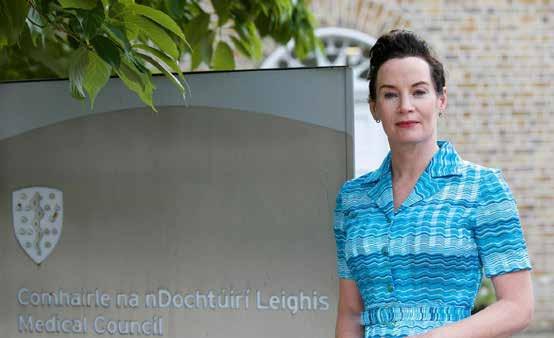
3 minute read
Medical Council recognises role of women doctors
Scholarship Award for Aoife
Congratulations to Aoife Delaney, Chief II Medication Safety Pharmacist, Pharmacy Department, Cork University Hospital on being awarded an Employment-based PhD Scholarship for Health Science Professionals by the College of Medicine and Health UCC.
Aoife's research is a collaboration between the Pharmacy Department Cork University Hospital and the School of Pharmacy, UCC. She will investigate medication safety communication strategies, and the development of a quality improvement intervention in an Irish hospital setting. This research will make an important contribution to new knowledge, and advance research in the area of medication safety, to improve patient outcomes.
Aoife will be supervised by Dr Aoife Fleming Lecturer in Clinical Pharmacy Practice, UCC, Dr Kirstyn James Consultant in Geriatric Medicine, Cork University Hospital, Dr Suzanne McCarthy Senior Lecturer in Clinical Pharmacy Practice, UCC and Ms Deirdre Lynch, Chief Pharmacist, Cork University Hospital.
Dr Suzanne McCarthy, Dr Aoife Fleming, Ms Aoife Delaney, Ms Deirdre Lynch and Dr Kirstyn James
Break the Bias – Doctors Urged
The Medical Council marked International Women’s Day by recognising the continued and increasing contribution of women doctors to the medical landscape in Ireland.
Medical Council President, Dr Suzanne Crowe, said that while the number of doctors on the Irish medical register has been increasing year on year, the number of young female doctors has also risen steadily over the past decade. “Given this year’s International Women’s Day theme of Breaking the Bias, this is an opportune time to highlight the dedication and contribution of women doctors to Irish healthcare.
“While the number of female doctors on the register is increasing, particularly among younger doctors, there is still work to be done in forging gender parity in the profession. Gender balance is not solely a women's issue, but also an economic issue, and improving the situation for female medics will positively affect patients. “Medicine, like many professions, has traditionally been male dominated, and I know of many women doctors who face gendered assumptions daily, when a patient might be expecting a male surgeon or specialist. “At the end of 2021, there were 25,959 doctors on the Medical Register, 45% of whom were female. There were 11,055 doctors on the Specialist Register, with 4,946 females. That’s 45% of the specialist register, when compared to just 38% ten years ago. “This trend is particularly evident among younger doctors in the 20 – 35-year-old category, where in 2021, 53% were females and 47% were males, the same as the previous year. While challenging gendered stereotypes, female doctors should expect equal treatment with their male
Dr Suzanne Crowe, President, Irish Medical Council

counterparts, but employers and training bodies must also take into account the necessity to allow a work-life balance for all.
“The Medical Workforce Intelligence Reports that the Medical Council publishes annually, highlights that family remains to be a reason why many doctors voluntarily leave the Medical Council register each year. Many of those that leave the register are women who feel that being a mother and caring for a family can make it difficult for them to maintain a good work life balance. In particular, maternity leave, and the demands of balancing both home and medical professional practice and the long working hours have been cited as reasons. “The past two years have also added an increased burden for all doctors, as a result of the COVID-19 pandemic. The challenges faced by the workforce, especially around childcare issues during lockdowns, and the fear of bringing an unknown illness home to family, brought great stress and worry to an already fraught situation. While we hope to have left the worst behind, lessons should be learned around managing some of these issues going forward. “As a doctor working in a children’s hospital, I work with a lot of great women, and will spend the day celebrating all they, and all women in medicine, do for their patients.”










